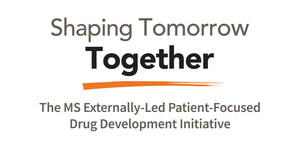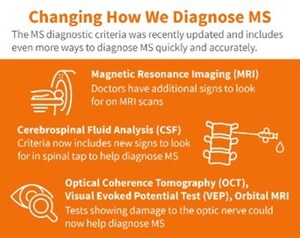
Part 2: Overview, Progress Toward Restoring Function and Ending MS
NEW YORK, Dec. 27, 2012 /PRNewswire-USNewswire/ -- The National MS Society supported new and ongoing initiatives to propel efforts to restore function to people with MS through its Discovery and Fast Forward research programs.
(Logo: http://photos.prnewswire.com/prnh/20090302/DC77093LOGO)
PROGRESS TOWARD RESTORING FUNCTION LOST TO MS
- New studies into the potential of adult skin cells and umbilical cord cells as a source of nervous system repair cells;
- A new pilot research program to tap MS-specific funds from the Illinois Lottery, with a focus on nervous system repair and novel rehabilitation approaches;
- Cutting-edge research to discover new targets to stimulate myelin repair and early testing of new approaches to treating MS symptoms;
- Clinical trials testing the ability of cannabis to treat spasticity, aspirin to fight fatigue, and innovative rehabilitation and exercise programs aimed at improving mobility, fatigue, spasticity and cognitive problems;
- A study using advanced MRI analysis to determine how the brain regions associated with pain are affected by MS.
Other important 2012 results toward restoring function include:
Nervous System Protection and Repair
First trial of experimental anti-LINGO to stimulate myelin repair – This first human phase I trial of BIIB033 (Biogen Idec), an immune antibody that inhibits LINGO-1, involved 64 healthy adult volunteers and 42 people with relapsing or secondary-progressive MS. There were no serious adverse events; headache was the most frequently adverse event reported. The authors concluded that the results support advancing this myelin repair strategy into a phase II clinical trial. Reported at the American Academy of Neurology annual meeting http://www.nationalmssociety.org/news/news-detail/index.aspx?nid=6377
Trial of patients' own adult stem cells appear safe and hints of benefit – Researchers in the UK published results of a small clinical trial involving 10 people with secondary-progressive MS, reporting that injecting a person's own bone marrow stem cells appeared safe and possibly beneficial in helping to protect the nervous system from injury. Further trials are now underway to establish its safety and potential benefit. http://www.nationalmssociety.org/news/news-detail/index.aspx?nid=5951
Collaboration to find new therapies to repair the nervous system in people with MS – Fast Forward is funding research at the Universities of Cambridge and Edinburgh, UK to screen for compounds that can stimulate myelin repair in MS. The project grew out of findings from a Nervous System Repair and Protection Initiative funded through the Society's Promise 2010 campaign. http://www.nationalmssociety.org/news/news-detail/index.aspx?nid=6767
Rehabilitation and Managing Symptoms Study suggests balance/eye movement training improves MS symptoms – University of Colorado researchers found that a 6-week balance and eye movement-focused exercise program improved balance, reduced fatigue, and reduced disability due to dizziness or disequilibrium, lasting for at least 4 weeks. A larger and longer study is now getting underway with National MS Society support. http://nationalmssociety.org/news/news-detail/index.aspx?nid=6119Rehabilitation technique improves memory – Learning and memory improved in people with MS with a technique that uses stories and imagery to cement learning. This was accompanied by increased activation of areas in the brain related to memory and learning. The Kessler Foundation Research Center investigation was funded in part by the Society's Mentor-Based Postdoctoral Fellowship program in rehabilitation research. http://www.nationalmssociety.org/news/news-detail/index.aspx?nid=5962
Hotter days may make mental tasks harder – This Society-co-funded study, which needs further exploration, may help people plan activities and may improve the design of future clinical trials. The study was done by Victoria Leavitt, PhD, and colleagues through a Mentor-based rehabilitation postdoctoral fellowship award to John DeLuca, PhD at the Kessler Foundation Research Center in West Orange, NJ. http://nationalmssociety.org/news/news-detail/index.aspx?nid=6208
Weight training improves walking and quality of life in small study of women with MS – The University of Arizona/University of Georgia study, funded by the National MS Society, used standard measures to evaluate the effects of the progressive resistance program, along with in-depth interviews to determine effects on quality of life. http://www.nationalmssociety.org/news/news-detail/index.aspx?nid=7027
Fast Forward and Concert Pharmaceuticals collaborate on MS spasticity and pain – the new collaboration funds the preclinical advancement of C-21191, a substance with the potential for treating spasticity and pain in MS. Fast Forward is committing up to $750,000 to help its advancement toward clinical trials. http://www.nationalmssociety.org/news/news-detail/index.aspx?nid=6034
Small study reports benefit of marijuana on MS spasticity – California investigators found some benefit of smoked marijuana against spasticity and pain in people with MS in a small clinical trial. Participants also experienced reduced thinking ability after smoking marijuana, highlighting the need for research on cannabis products or other treatments that can more selectively reduce painful symptoms without producing adverse effects on cognitive function. Additional research is being supported by the Society and others. http://nationalmssociety.org/news/news-detail/index.aspx?nid=6374
Study suggests Latinos with MS experience worse pain and other symptoms – A National MS Society-supported study at the Mississippi State University found that a sample of Hispanics/Latinos with MS reported more pain, fatigue, cognitive problems, mental health problems, and dissatisfaction with their access to mental health care than the general MS population, calling attention to the need for more accessible and culturally relevant mental health and social services. http://www.nationalmssociety.org/news/news-detail/index.aspx?nid=6044
CCSVI research continues –
- The 7 research projects investigating MS and CCSVI (chronic cerebrospinal venous insufficiency, http://www.nationalmssociety.org/ccsvi) that were launched with a $2.4 million investment by the National MS Society and the MS Society of Canada, reached the two-year milepost, and most are in the process of completing their projects. http://nationalmssociety.org/news/news-detail/index.aspx?nid=6803.
- The Canadian Institutes of Health Research announced that a research team has been chosen to conduct a phase I/II clinical trial to determine the safety of venous angioplasty and obtain evidence on patient outcomes in people with MS. This initiative is also being supported by the MS Society of Canada. http://www.nationalmssociety.org/news/news-detail/index.aspx?nid=6260
- At ECTRIMS 2012, results were presented of a large prevalence study in Italy suggesting that CCSVI occurs at a low frequency in those with MS and in others without MS. Research on this phenomenon is still ongoing. http://www.nationalmssociety.org/news/news-detail/index.aspx?nid=7052
PROGRESS TOWARD ENDING MS FOREVER
To drive efforts to understand what triggers MS and ways to prevent it, the Society:
- Convened an international summit on vitamin D in MS;
- Renewed funding for an enhanced MS DNA core resource bank to foster better understanding of genes that make people susceptible to MS and may also control the course of an individual's MS.
- Supported several new research projects aimed at:
- Understanding how risk factors such as vitamin D levels and genes to contribute to a person's susceptibility to developing MS
- investigating how bacteria that naturally live in the human body, including in the intestines, may influence MS susceptibility and disease activity
- Launched a new, $100,000 annual cash prize to recognize scientists whose inventive work is propelling measurable MS research progress. The Barancik Prize for Innovation in MS Research is the largest ever cash prize for MS research, and is made possible by the generosity of the Charles and Margery Barancik SO Foundation. http://www.nationalmssociety.org/news/news-detail/index.aspx?nid=7096
Other important 2012 results toward ending MS include:
Breakthrough in understanding gene activities – A government-supported, global study called the ENCODE project has mapped out specific biological functions of more than 80% of the human genome (genetic material), bringing into sharper focus the complex controls over the turning on and turning off of genetic information within cells. This leap-frog advance will greatly enhance efforts to understand the influence of genes on human diseases like MS. http://www.genome.gov/27549810
Studies further understanding of vitamin D and MS risk –
- Researchers in the United Kingdom and Canada reported an association between a rare variation of a gene that controls vitamin D levels and the development of MS in rare families with multiple members who have the disease. This gene variation causes dysfunction that leads to vitamin D deficiency. http://www.nationalmssociety.org/news/news-detail/index.aspx?nid=5778
- In a separate study, Swedish investigators found that high levels of vitamin D in the blood of pregnant women was associated with reducing their risk of developing MS later. http://www.nationalmssociety.org/news/news-detail/index.aspx?nid=7127
- Men with low blood levels of vitamin D may be more susceptible to MS disability, according to a University of Utah study of 500 people with different types of MS. Read more results from the American Academy of Neurology meeting http://www.nationalmssociety.org/news/news-detail/index.aspx?nid=6377
How Epstein-Barr virus may play role in MS – This virus has been linked to increased risk for MS. In active brain lesions in people who had MS in their lifetimes, an international team found high levels of a chemical that helps the body fight viruses, and nearby, immune B cells latently (inactively) infected by Epstein-Barr virus. There was no sign of active viral infection. This may point to a possible mechanism for how the virus might indirectly stimulate MS disease activity. http://www.nationalmssociety.org/news/news-detail/index.aspx?nid=5836
Lives were changed in 2012 with the introduction of a second oral MS therapy, the launch of new collaborative research efforts, and significant results of recent studies promising more options in 2013 for people living with MS.
Save this date January 30, 2013, 2:00 – 3:00 p.m. ET and sign up for the live webcast, "From the Frontlines: New Avenues In MS Research for 2013." Visit the National MS Society website.
About Multiple Sclerosis
Multiple sclerosis, an unpredictable, often disabling disease of the central nervous system, interrupts the flow of information within the brain, and between the brain and body. Symptoms range from numbness and tingling to blindness and paralysis. The progress, severity and specific symptoms of MS in any one person cannot yet be predicted, but advances in research and treatment are moving us closer to a world free of MS. Most people with MS are diagnosed between the ages of 20 and 50, with at least two to three times more women than men being diagnosed with the disease. MS affects more than 400,000 people in the U.S. and over 2.1 million worldwide.
About the National Multiple Sclerosis Society
The National MS Society addresses the challenges of each person affected by MS. To fulfill this mission, the Society funds cutting-edge research, drives change through advocacy, facilitates professional education, collaborates with MS organizations around the world, and provides programs and services designed to help people with MS and their families move forward with their lives. In 2011 alone, through its national office and 50-state network of chapters, the Society devoted $164 million to programs and services that assisted more than one million people. To move us closer to a world free of MS, the Society also invested $40 million to support more than 325 new and ongoing research projects around the world. The Society is dedicated to achieving a world free of MS. Join the movement at www.nationalMSsociety.org.
SOURCE National Multiple Sclerosis Society






Share this article